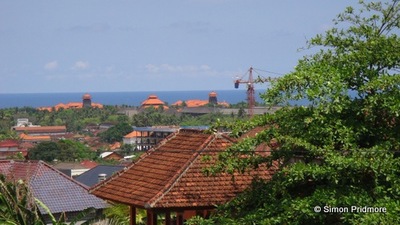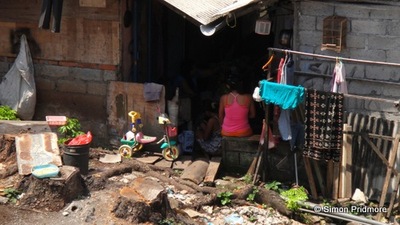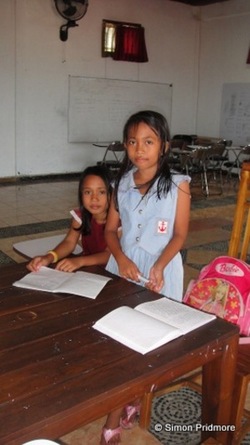Giving dispirited communities a helping hand, ROLE Foundation advocates education and training to bridge the two worlds that seem to exist in Bukit Badung of Bali, Indonesia. Simon Pridmore tells us how this is being done.
Bali, 1 June 2013. If the map of Bali looks like a chicken laying an egg (which it does), then Bukit Badung often referred to simply as “the Bukit,” is the chicken’s feet - a limestone, largely waterless peninsula south of the airport with mangroves in the north, some of the best surfing on the planet to the west and Indonesia’s flagship real estate to the east.
Many visitors to Bali may not visit the Bukit but most will certainly see bits of it in the form of irregular white quarried boulders loaded on the back of convoys of yellow trucks heading for housing estates, villa projects and road works throughout Bali and beyond.
Indonesia’s Showpiece

Nusa Dua's Hotel Row is all posh and proper, but that's just one side of the story.
The focus of the majority of visitors to the Bukit is Nusa Dua, recently chosen by the Indonesian government as the showpiece location for a series of headline international meetings attended by the presidents of all the ASEAN nations, as well as other states with significant interests in the region, the USA, China, Japan and Russia. For a few days the peninsula was virtually under martial law: teams of cops manned every junction, sports pitches became helicopter landing fields and small shopping malls became temporary garrisons for elite military units flown in from Java. Off the coast, armed patrol boats manned by guys in helmets and camo mingled with the life-jacket-clad tourists bouncing through the waves on their inflatable bananas. An aircraft carrier appeared off shore, dwarfing the white castles of the cruise ships.
Of course, in common with the majority of visitors to the Bukit, the dignitaries will only have seen the actual village of Nusa Dua through dark-tinted windows in brief cameos of concrete, tin roofs, cigarette adverts and open mouths as their motorcades swept through it. Their destination was the complex of luxury hotels that shares the village’s name but none of its complications. The world beyond the tall walls and the security airlocks is one of lawns tonsured and watered daily, of sandy beaches raked clean every morning, of traffic-free thoroughfares and uncrowded boutiques. Here there are no touts or beggars, no plastic bags bowling down the streets like multicoloured tumbleweed, no-one who doesn’t smile and say hello as you pass by, nobody who doesn’t “belong.”
Bali’s increasing tourist numbers have encouraged a dramatic expansion of the world behind the walls, this “Forbidden City.” Vast new hotels are being constructed along the beaches to the south of the current complex; huge tracts of coastline have been laid bare and cranes, towering far, far above the tallest palm tree watch over the hordes of workers building paradise below.
Two Islands

The other world in Bukit Badung, where prosperity seems to have missed it altogether.
Prosperity has come to Bukit Badung. However, Nusa Dua means “two islands” in Bahasa Indonesia and the name is tragically appropriate. While the Bukit is the prestige address of some of the highest of high-end resorts, it is also home to some of the lowest paid and most over-looked of Bali’s residents. The dry climate, allied to fruitless soils above the limestone rock bed means that life here has always been difficult, but now, squeezed out of the boom and squeezed in between the ever expanding walls of the resorts; excluded from areas of beach and hillside land that were hitherto theirs to work, the people of the peninsula are in danger of becoming Bali’s forgotten folk.
Development has deprived them of the opportunity to continue traditional livelihoods as fishermen, seaweed harvesters and subsistence farmers and many do not own the skills, even at a basic level, to benefit from the employment opportunities offered by the transformation of their homeland. Most of the construction workers on the projects are imported from elsewhere in Indonesia, creating social issues, over-crowding and frequent conflict.
An Unlikely Hero
However, the people of the Bukit have an unlikely knight carrying their banner aloft and fighting to give them a chance to escape from the economic and environmental traps in which they have been caught. In 2007 Australian surfer and jewellery entrepreneur Mike O’Leary sold his businesses in Bali and established a foundation he called ROLE (Rivers, Oceans, Lands, Ecology) As the organisation’s name suggests, the original aim was to combat the detrimental consequences of urban development and ROLE is heavily involved in such issues. However, Mike also recognised the adverse impact that environmental changes were having on the local people and decided to do something about it, focussing especially on those who were right at the bottom of the privilege pile, the socially disadvantaged and unskilled women of the area.
Their problems the are not all new and borne out of progress. They also lie partly in societal attitudes. Many of the girls born to the poorest families on the Bukit have no schooling at all. As Mike elaborates, “in poor families, girls face a gender bias with only two girls for every eight boys going to primary school. Over 200,000 women in Bali are illiterate and salaries for unskilled women are often far below the official minimum wage.”
ROLE takes the view that education is the key to escaping from poverty and riding the wave of Bali’s tourist-driven economy. Often, the first priority for the disadvantaged women who pass through its doors is to acquire at least a minimal degree of literacy in Bahasa Indonesia and numeracy as well as basic life skills such as grooming, manners, respect, motivation, self-esteem and basic employment skills like customer service, work ethics and honesty.

Balinese women lack education, skills and suffer in poor conditions and poorly paid jobs.
Once they have achieved functional performance levels, the next step is to empower them with vocational training to enable them eventually to find a place within the island’s workforce or even to start their own small business. With the support of a number of local companies, ROLE then organises on-the-job training and, ultimately, full time jobs for successful graduates.
For example, at the ROLE Eco Learning Park, there is a purpose built facility where members of staff from Bali Bisa Spa train students who have expressed interest and shown aptitude in massage therapy. For others, Bumbu Bali offers vocational cookery and waiting courses in its restaurant in Tanjong Benoa.
New ROLE Facilities

Students of ROLE Foundation learn math, skills and in the process, gain self-respect.
New ROLE facilities in Jalan Siligita, Nusa Dua offer two classrooms and a café that allows students to acquire in-house the sort of hospitality and catering training that will enable them one day to find work in one of Bali’s plethora of culinary establishments. The facilities’ location “in town” also enables ROLE to run night classes for women who have unskilled and underpaid jobs during the daytime so that they can study and improve their prospects.
When we visited, Mike showed us around. In one of the classrooms were a couple of young girls waiting for a math lesson, books open in front of them, showing rows of neat work. ROLE is the only school they have. You do not have to look far to see where these girls have come from. Mike directed our attention to the other side of the wall and an area of waste ground charred by fires and strewn with trash. Beyond we saw a number of lean-to tin shacks where groups of girls, not much older than the two math students, were sitting in the shade watching bare-bottomed babies playing in the dirt.
Mike invited us to stay and observe a typical day. It was an eye-opening experience. The over-riding impression was that for many of the students, ROLE’s primary function is to provide them with a safe haven. They come and go as they please. It is a place where they have status and where they are treated with respect. It is also a place where they can get together, learn to read and write, and acquire a trade.
Role Model
We watched a sales executive from Surfer Girl conducting retail training for eight students in a shop environment created specifically for the purpose next to the café. It occurred to us that this smartly dressed, confident young lady was not just imparting her knowledge and experience to the girls seated in front of her. You could tell by the look in their eyes that she was also serving as a role model; an independent, educated woman whom, thanks to ROLE, they could hope some day to emulate.
ROLE Benefits
The benefits of the kind of training that ROLE provides go far beyond simply empowering the students themselves. On a social level, imbuing the disadvantaged women of the Bukit with greater education and social consciousness will lead to improved family planning, reduced infant mortality, higher living standards, enhanced environmental awareness, better community health and sanitation. Perhaps, best of all, statistics show that the children of skilled women are likely to grow up better educated and skilled themselves.
More about ROLE
To find out more about ROLE, take a look at www.rolefoundation.org or call in for a coffee at the Jalan Siligita café. Connect with ROLE on facebook too.
Liked this article? You might also enjoy reading how diving opens up a whole new world to the physically challenged in Bali, also written by Simon Pridmore.